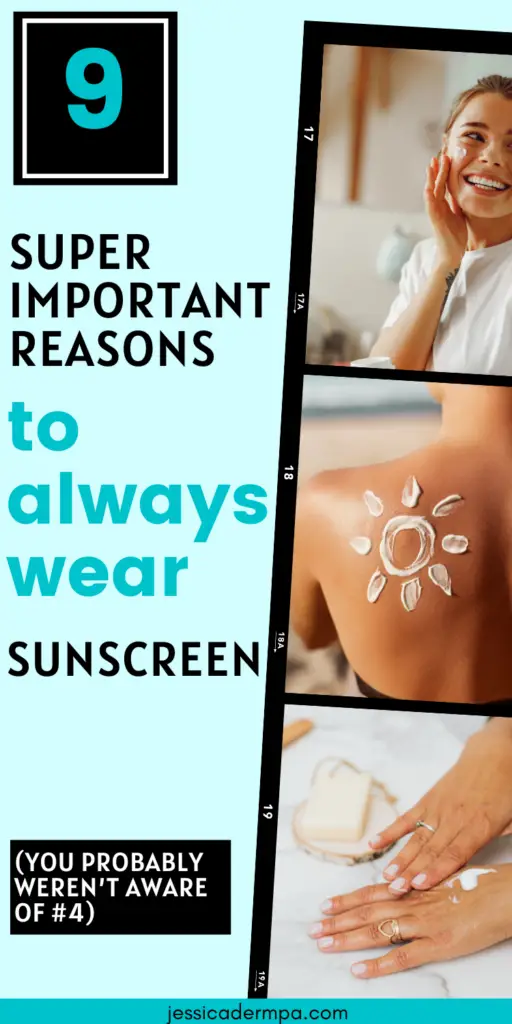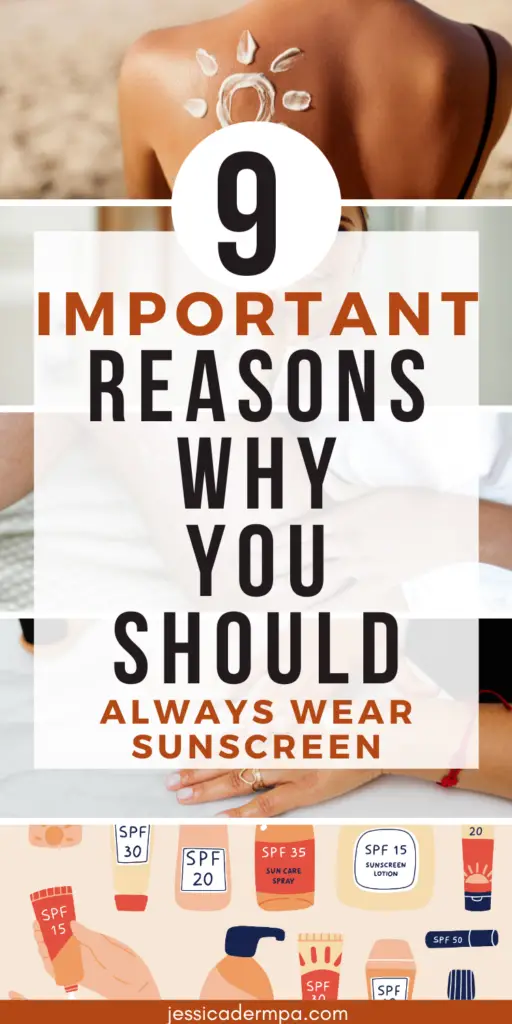Did you know there are countless reasons why you should always wear sunscreen every day? If you need convincing about the benefits of sunscreen, look no further. I have broken down 9 of the many reasons why sunscreen is vital not only to your health but also to your appearance. When in doubt, always wear at least 30 SPF and reapply every 2 hours. Unless you live underground, you should be wearing sunscreen every single day. Let me repeat that: You should wear sunscreen every. Single. Day. 365 days per year. You can get indirect sun exposure through windows and even in the minute it takes to walk to and from your car. Make it a part of your daily routine. Your future self will thank you for it. Now, let’s dive into 9 different reasons why you should ALWAYS wear sunscreen.
1. Prevent Skin Cancer
The number one reason I recommend applying sunscreen is because it can potentially save your life. Now, you may consider this dramatic, but let’s say you have a family history of melanoma and you are pale and a redhead. Do you know your chances could be up to 100 times more likely to develop melanoma than the average person? Melanoma can kill you. Even if you don’t fall into that category of high risk, you can still develop it. Why risk the chance?
What is Melanoma?
Melanoma is a type of skin cancer that develops from the pigment-producing cells known as melanocytes. While it is less common than other skin cancers, melanoma is more dangerous because it can spread to other parts of the body if not detected early. Regular use of sunscreen can significantly reduce your risk of developing melanoma by protecting your skin from harmful UV rays.
Other Types of Skin Cancer
Apart from melanoma, there are other types of skin cancer such as basal cell carcinoma (BCC) and squamous cell carcinoma (SCC). Both BCC and SCC are linked to cumulative sun exposure and are more common in people with prolonged outdoor activities. Wearing sunscreen can help prevent these cancers by protecting your skin from chronic UV damage.
Related post: How To Detect Skin Cancer Early
2. Prevent Scars from Skin Cancer Surgery
Preventing skin cancer also means you are preventing scars. Basal cell carcinomas are extremely common, especially on sun-exposed skin. These tiny red bumps, when surgically excised, typically leave a much larger scar than anticipated. If you want to prevent unnecessary surgery scars on your face, neck, hands, or anywhere on your body, then wear your sunscreen!
Surgical Scars and Cosmetic Concerns
Skin cancer surgeries, although often necessary, can leave significant scars. These scars can be more noticeable in areas with delicate skin such as the face and neck. By wearing sunscreen, you reduce your risk of developing skin cancer, and consequently, the need for surgical interventions that can lead to scarring. Protecting your skin now can save you from cosmetic concerns and the emotional distress associated with visible scars.
Minimally Invasive Treatments
In some cases, early-stage skin cancers can be treated with minimally invasive procedures such as cryotherapy or topical medications. However, these treatments are still not as effective as preventing the cancer in the first place. Consistent use of sunscreen helps in reducing the occurrence of skin lesions that might require treatment, thus preserving the integrity and appearance of your skin.
3. Prevent Pigmentation Changes
The sun causes pigmentation changes on the skin, including sun freckles, post-inflammatory hyperpigmentation, post-inflammatory hypopigmentation, melasma, and more. Many people spend a lot of money to cover up or cosmetically treat these types of pigmentation changes. Imagine if you started protecting your skin properly from a young age. These issues would likely not arise, saving you countless amounts of money! Not to mention, you will look better.
Types of Pigmentation Changes
Sun Freckles: Also known as solar lentigines or age spots, these are flat, brown spots that develop on areas exposed to the sun. They are harmless but can be cosmetically displeasing.
Post-Inflammatory Hyperpigmentation (PIH): This occurs after skin inflammation or injury, such as acne, eczema, or an insect bite. Sun exposure can exacerbate these dark spots, making them more noticeable.
Post-Inflammatory Hypopigmentation: This is the loss of skin color following inflammation or injury. Protecting your skin from the sun can help prevent these areas from becoming more pronounced.
Melasma: Often called the “mask of pregnancy,” melasma is a condition where brown or gray-brown patches appear on the face. Sun exposure can trigger or worsen melasma, so diligent use of sunscreen is crucial.
Related post: 4 Frustrating Skin Disorders That Cause Uneven Skin Tone and How to Treat Them
Prevention is Better than Cure
Treating pigmentation issues can be costly and time-consuming. Procedures such as laser treatments, chemical peels, and topical medications can help, but they are not always effective and can require multiple sessions. Using sunscreen regularly can prevent these pigmentation changes from occurring in the first place, saving you both time and money.
4. Slow Down Wrinkling of the Skin
Did you know that besides natural aging, sun exposure can also cause early or worsening wrinkling of the skin? Who wants to look old and wrinkly when they’re only in their 30s or 40s? Sun protection can slow down the appearance of aging, helping you maintain a youthful look.
How UV Rays Cause Wrinkles
Ultraviolet (UV) radiation from the sun breaks down collagen and elastin fibers in the skin, which are essential for maintaining its structure and elasticity. When these fibers are damaged, the skin loses its firmness and starts to sag, leading to the formation of wrinkles and fine lines. By wearing sunscreen, you can protect these vital components of your skin and keep it looking younger for longer.
Photoaging vs. Chronological Aging
Photoaging refers to the premature aging of the skin caused by repeated exposure to UV radiation. This includes not only wrinkles but also rough skin texture, uneven pigmentation, and loss of skin tone. Chronological aging, on the other hand, is the natural aging process that occurs over time. While we cannot stop chronological aging, we can significantly reduce the effects of photoaging by using sunscreen daily.
5. Prevent Easy Tearing and Bruising of Your Skin
Have you ever seen an elderly person who has spent a lifetime outdoors? Their forearms tell the tale of their sun exposure. The more sun exposure we have throughout our lives, the more brittle our skin becomes. Yes, it naturally thins, but the sun can quicken that process, leading to easy tearing or bruising of the skin. Some of my patients who grew up on farms have to walk around with a ton of band-aids on their forearms because their skin is constantly tearing.
The Effects of UV Damage on Skin Structure
Chronic sun exposure causes changes in the skin’s structure, making it thinner and more fragile. The breakdown of collagen and elastin not only leads to wrinkles but also weakens the skin, making it more susceptible to injury. This is particularly noticeable in areas frequently exposed to the sun, such as the forearms and hands.
Protecting Your Skin’s Integrity
Using sunscreen helps maintain the integrity of your skin by protecting it from harmful UV radiation. This means fewer cuts, tears, and bruises, which can be especially important for older adults whose skin is already more delicate. By incorporating sunscreen into your daily routine, you can keep your skin stronger and healthier for longer.
6. Prevent Painful Burns
Most of us, at one point in our lives, have developed a sunburn. Sunburns can be extremely painful and can put you out of commission for several days to weeks. They can also increase your risk of developing skin cancer later in life. An easy way to prevent sunburn is to keep up with your sun protection.
The Science Behind Sunburn
Sunburn occurs when the skin is exposed to excessive UV radiation, causing damage to the skin cells. This damage triggers an inflammatory response, leading to redness, pain, and swelling. Severe sunburns can result in blisters and peeling skin, and repeated sunburns increase the risk of skin cancer.
The Importance of Prevention
Preventing sunburn is far easier and less painful than treating it. Applying sunscreen not only protects your skin from immediate burns but also reduces the cumulative damage that can lead to long-term skin issues. Remember to reapply sunscreen every two hours and after swimming or sweating to ensure continuous protection.
7. Prevent Peeling of the Skin
Who wants to shed like a snake? I certainly do not. Sunburns lead to peeling of the skin, which can be uncomfortable and kind of gross. An easy way to prevent that is to, you guessed it, keep up with your sun protection.
The Peeling Process
Peeling is your skin’s way of getting rid of damaged cells after a sunburn. While it is a natural healing process, it can be itchy, unsightly, and uncomfortable. Peeling skin can also be more vulnerable to infection and further damage.
Maintaining Healthy Skin
Using sunscreen helps prevent sunburn and the subsequent peeling, keeping your skin smooth and healthy. By avoiding sunburns, you also reduce the risk of developing other complications, such as infections and long-term skin damage. Make sunscreen a regular part of your skincare routine to maintain your skin’s health and appearance.
8. Prevent Certain Rashes from Flaring
Did you know there are quite a few types of rashes that can flare with sun exposure? Some examples include rosacea, melasma, lupus, and polymorphous light eruption. These rashes can be uncomfortable and managing them can cost money and time at the dermatology office.
Sun-Triggered Rashes
Rosacea: This chronic skin condition causes redness and visible blood vessels in the face. Sun exposure is a common trigger for rosacea flare-ups.
Melasma: As mentioned earlier, melasma causes brown or gray-brown patches on the skin, primarily on the face. Sun exposure can worsen these patches.
Lupus: Lupus is an autoimmune disease that can cause a sun-sensitive rash known as the butterfly rash, which appears on the face. Sun exposure can trigger or worsen this rash.
Polymorphous Light Eruption (PMLE): PMLE is a condition where exposure to sunlight causes an itchy rash. It is more common in women and people with fair skin.
Managing Sun-Sensitive Conditions
If you have a condition that makes your skin sensitive to the sun, wearing sunscreen is essential. Not only does it protect your skin from UV damage, but it also helps prevent flare-ups of these conditions. In some cases, avoiding the sun altogether may be necessary, but for those times when sun exposure is unavoidable, a broad-spectrum sunscreen with a high SPF is your best defense.
9. Encourage Family and Friends to Always Wear Sunscreen
Last but not least, applying sunscreen can be a gentle reminder for family and friends to also apply sunscreen. In doing so, you are not only protecting yourself but also your loved ones. Keep up the good work!
Leading by Example
By consistently using sunscreen, you set a positive example for those around you. Your family and friends may be more likely to follow suit when they see you prioritizing your skin health. Encouraging others to use sunscreen can help protect them from the harmful effects of UV radiation and promote overall skin health.
Building a Sunscreen Habit
Making sunscreen a regular part of your routine can inspire others to do the same. Share your knowledge about the benefits of sunscreen and the risks of sun exposure. Simple reminders and tips can go a long way in helping others adopt sun-safe behaviors. Together, you can create a supportive environment that emphasizes the importance of sun protection.
Conclusion
In summary, wearing sunscreen daily is one of the simplest yet most effective ways to protect your skin from various harmful effects of sun exposure. From preventing skin cancer to maintaining a youthful appearance, the benefits of sunscreen are numerous and significant. Make it a habit to apply sunscreen every day, and encourage those around you to do the same. Your skin will thank you in the long run.
For more tips on skincare and sun protection, stay tuned to our blog. If you have any questions or need personalized advice, feel free to reach out to your dermatology provider.
*Disclaimer: Opinions expressed are solely my own and do not express the views or opinions of my employer. Information on this website is for education and entertainment purposes only. Content is my opinion. It is not substituted for your own doctor’s medical care or advice. One should not make any health or medical-related decisions based in whole or in part on any content on this site. Content is not intended to replace the services of a licensed, trained health professional. Content may not apply to you as an individual. Although I will update my website with current information, this website is not a definitive guide to dermatology.






View comments
+ Leave a comment